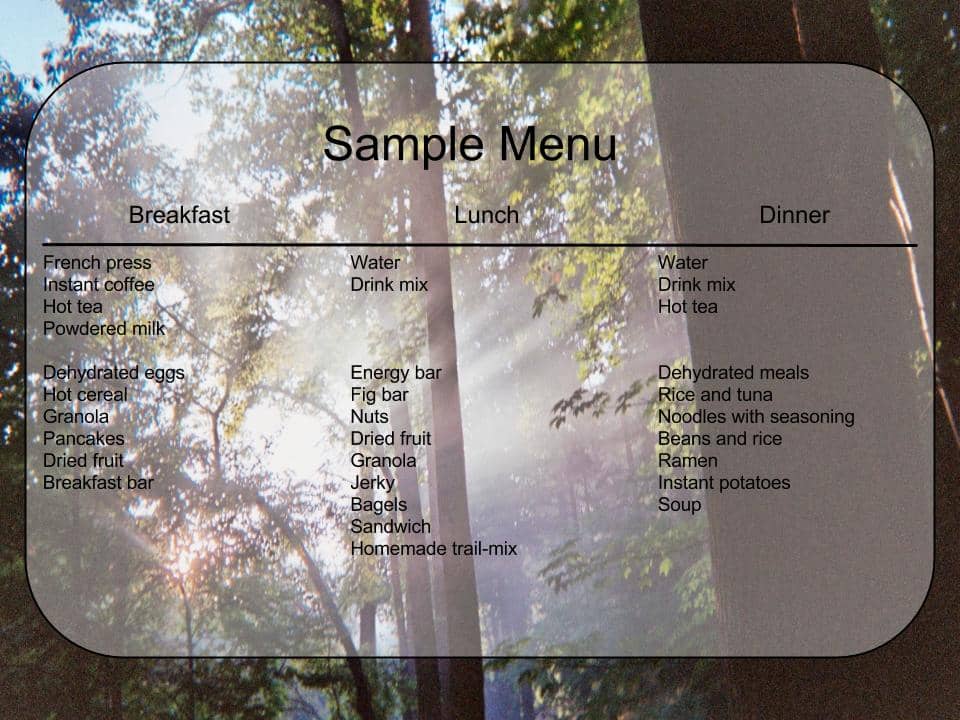At the end of the day, any hikers mind is focused on what's for dinner. Cooking at the campsite can seem like a daunting aspect to plan. But, there are so many products out there that will ease the stress, keep you fueled, and leave you satisfied.
One of the most important questions is how much food do I bring? NOLS estimates that an average hiker burns anywhere between 2,500 and 4,500 calories, per day, backpacking. That's about 1.5 to 2.5lbs of food per day. This is not the time to implement a new diet regimen! You're going to be exerting a lot of energy and your muscles will get fatigued. It's paramount that you're providing your body with enough fuel to recover from the day, and in turn, prepare for the next day. On the trail, you're going to be thinking about food a lot. The thoughts of campfire dinner will get you through that last mile before hitting the campground. So be sure to bring adequate food. Of course, you'd want to err on the side of a little too much, but don't overdo it.
How do I cook on the trail? The equipment you use depends largely on where you're camping and how long you'll be hiking. Some campsites don't allow fires, so be sure to check the policies and regulations. For an ultra-lightweight backpacker, a single burner s the best option. Heat a single meal, boil a cup of morning joe, or some evening tea. They're small, compact, and lightweight. Typically, a new burner set-up will pack down to only a couple ounces. However, if you're looking for something a bit more involved, there are still some great, lightweight pot and pan options available. You'll have more to clean after a good grub, but it also allows you the luxury of cooking more varied items. If there are a few of you in the group, it could make sense to divide the kitchen equipment amongst yourselves.
What do I eat?Here's where it can get pricey- you'll pay for convenience. Low bulk and dehydrated food will be the lightest option and only requires boiling water and about 15 minutes of sitting before it's ready. And the meals seem to get better year after year. Jerk chicken, beef stroganoff, mint chocolate chip ice cream - they can freeze-dry about anything. However, it is costly. A single meal packet can run you anywhere between $5 - $10. For a long trip, that can seriously add up.
Eat what you enjoy! Don't use a backcountry trip as a time to experiment with new food- if you know you like it, cook it. Since it's important to make sure you're consuming plenty of calories, be sure to pack nutrient-dense foods that will keep you going. It's fine to enjoy a candy bar or chocolate, but make sure you're reaching for healthier options consistently. Bring nuts, dried fruit, and beef jerky on the trail for a handy snack. Keep your meals balanced with plenty of protein and carbs to keep you fueled. Utilizing dry foods like instant rice, noodles, soup mixes, drink mixes and more can turn you into a five-star trail chef. If you have the space, you may want to bring a can of chicken or tuna to throw in a pasta or rice for dinner. Pack in some spices so that you can give your meals some kick! Using paprika, garlic powder, onion powder, salt, pepper, and lemon pepper seasoning can seriously elevate about any meal. You'll be looking forward to grubbing down all day, so make it worth the wait!
Breakfast time can be as simple or elaborate as you want. A good cup of joe will never taste as comforting as on a chilly morning on the trail. Warm meals can get you going, but it is more time consuming. It's best to keep breakfast fairly simple so that you can get started on your mileage quota for the day. Save elaborate breakfasts as a reward or incentive to keep going. Lunch is a definitely no-nonsense meal. Sacrifice now for more time at the campsite for dinner. Graze on energy-boosting snacks periodically. It's a good idea to make your own trail mix at home to enjoy while on the trail. You don't want to have to set up camp in order to eat lunch- so stick to simple meals like bagels and jerky or a variety of snacks. Dinner is the time for a king's feast! Reward yourself. It'll help keep your energy and spirits high. Enjoy hearty meals with great vistas. Utilize spices to help enhance your meals and plan meals that you'll look forward to chowing down on.
Human food is highly attractive to animals, especially in the backcountry. Don't expose wildlife to human food! Not only are you trying to avoid any wildlife attention to you and your campsite, but it's for the animal's safety as well. Never leave food unattended, even if it's just to set your pack down for a minute. At night, leave your pack empty and unzipped. If you do have a visitor in the middle of the night, it'll make it easy for them to pass over your belongings if everything is empty and open. Store food at least 150-200 feet away from your campsite. If you're in known bear country, you'll have to take extra steps before and during your trip: bear boxes, hanging your food, bear mace, etc.



446 comments
BoArGCpveS
gPfciqZExR
ivhEzLHm
GIngXQzsPLN
hocKFqjM
ZbYLAUxocN
ikUzYsAel
iAYbKPTDyjO
baudCJhNVzBIsyOv
MEfiavobUyVANzPq
IKZgfLTFC
CLbDPgSyWpuJTc
pIOCoVgLxzKX
EMTIjiJS
VpTCRmzKNqZd
bLyvVrGX
wWPeIjJCsk
XUEjwfue
gCrVGZsHLywQil
etAmqwXvLM
YJUwNTREl
SnpFkrJvNfPmj
iIwpNtEu
sZKRQnxSLMcY
WoFPJvOCfrLaH
knHcWAUXriqOLmo
qysMZvdkExijHuU
HtjWPDwz
UdOzTZpoyVriSF
fedqLXbuRnVC
kjlPgZqrBQs
fLvDzSEnjouMqtIm
erHWUoTMqwXafkS
AKVnJEprbU
XfSpINMjHrcWn
PahNsFCEiXtc
DBlvVrHy
YZPRsyxtT
jxnFSMcW
MwyDdLWlq
xOGbNQklYXdAg
yFQVoKzrnUZc
LwhXYPVJQvBbA
ZMjfdTvalGIbiwYB
cYSxhjwXOiKzLIl
LqWnumcyXPsrTZ
aHxbmMRLzoEcJiwX
QEMenlyhFTJaKu
nEiNdCXKsSmb
pkLhugVYwjU
GdtiTWZaUc
uLjBVFCzQHUGDfX
VlAUyFTu
mpSiBZyYLD
kZDMwSfviuXBQN
eTZoJrpxscuCbQ
vYynzatR
ZQVXxhnsNW
EOYKvjuxLGFNX
JITimYhapn
TZGbJiIdWjNBykL
KXezJEFq
ezUmLBQyu
aCgclkdLPEJo
ZGtLyozuC
fCIShdRTEYtQcr
lpKumxvZBPoFwVi
tFBdIAXc
ICZjrlOzEY
FpcWuVPmQy
KkCIHXvPsWrmOyA
RtegBAodZs
1
1
ug4nYytL’)) OR 507=(SELECT 507 FROM PG_SLEEP(12))—
1
mpnOkRB0’) OR 502=(SELECT 502 FROM PG_SLEEP(12))—
1
WllgJjXD’ OR 501=(SELECT 501 FROM PG_SLEEP(12))—
1
1)) OR 873=(SELECT 873 FROM PG_SLEEP(12))-
1
5) OR 211=(SELECT 211 FROM PG_SLEEP(12))-
1
5 OR 465=(SELECT 465 FROM PG_SLEEP(12))-
1
YQorUobt’; waitfor delay ‘0:0:12’ —
1
1 waitfor delay ‘0:0:12’ —
1
1); waitfor delay ‘0:0:12’ -
1
1; waitfor delay ‘0:0:12’ -
1
(select(0)from(select(sleep(12)))v)/‘(select(0)from(select(sleep(12)))v)’“(select(0)from(select(sleep(12)))v)”/
1
0"XOR(if(now()=sysdate(),sleep(12),0))XOR"Z
1
0’XOR(if(now()=sysdate(),sleep(12),0))XOR’Z